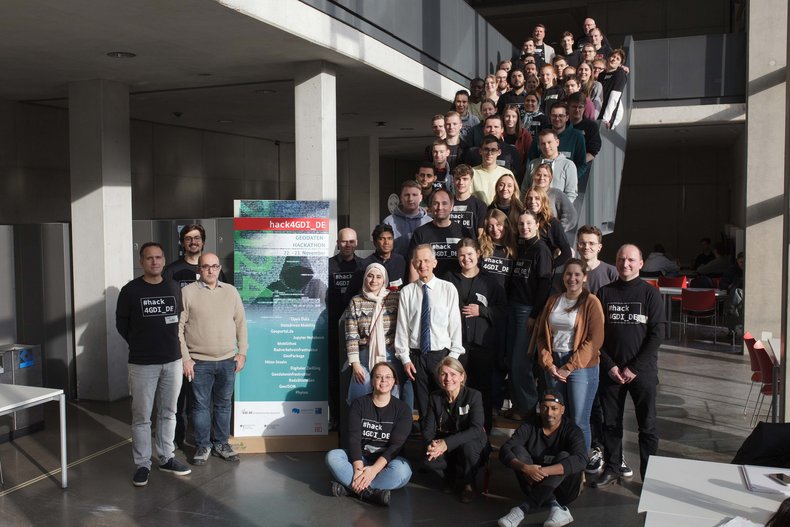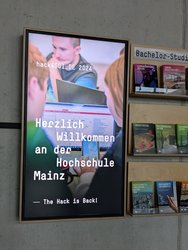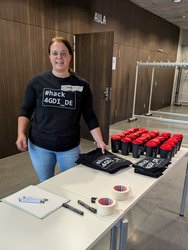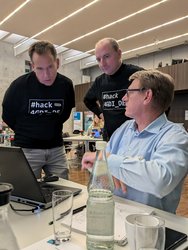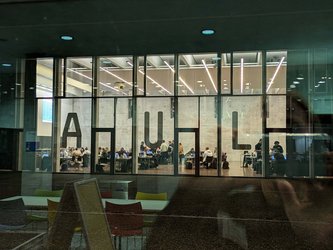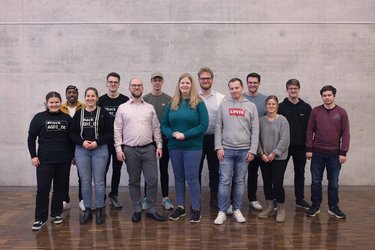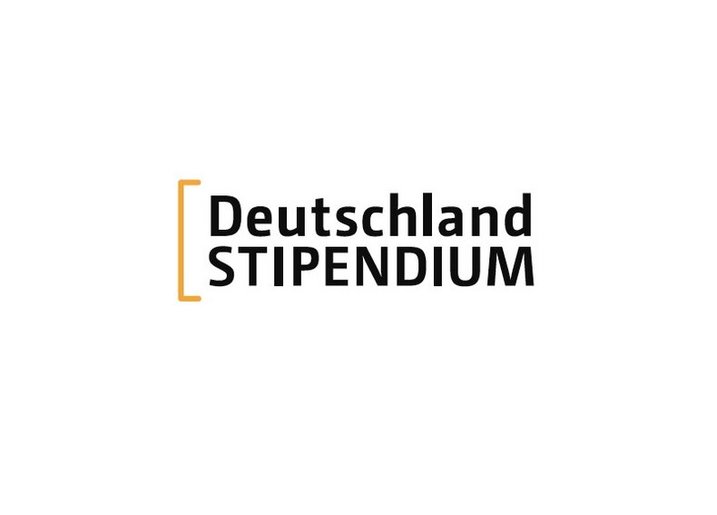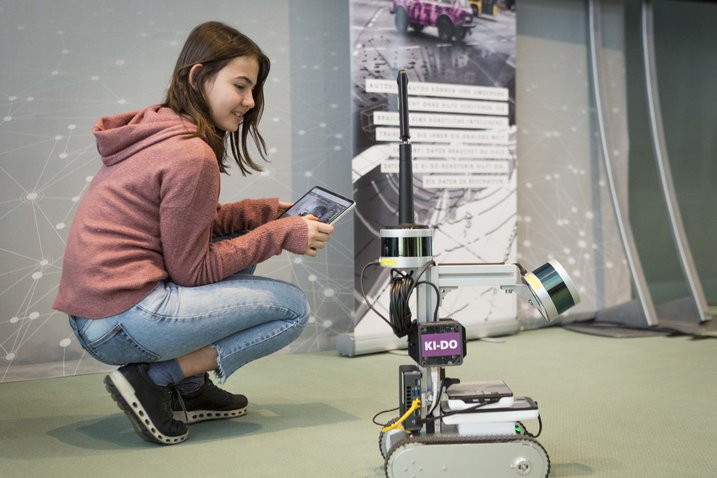Some 60 creative and highly motivated students took on the challenges of the second edition of “hack4GDI_DE” at Mainz University of Applied Sciences last weekend. Participants came from three universities in the Rhine-Main region along with Bochum and Karlsruhe. The 11 teams worked well into the night to develop fresh ideas and concepts relating to geodata from the GDI-DE, public administration and other sources.
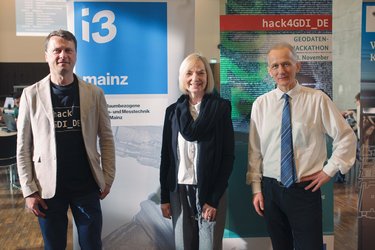
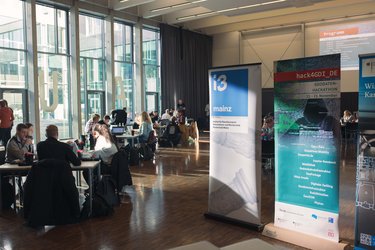
Marcus Brühl (Head of the GDI-DE Coordination Center), Susanne Weissman (President of Mainz University of Applied Sciences) and Dr. Eckart Brauer (BMI) welcomed the students
The challenges ranged from developing interactive information maps on cycling mobility and dashboards to current social and environmental issues such as urban heat islands. The participants were given just about 30 hours to come up with a solution and they then presented their results to a panel of judges made up of geodata experts from the administration and science sectors and PR and design professionals.
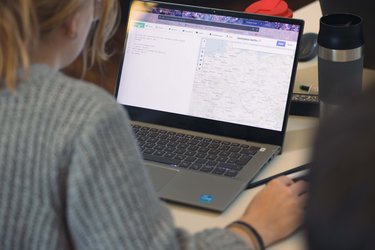
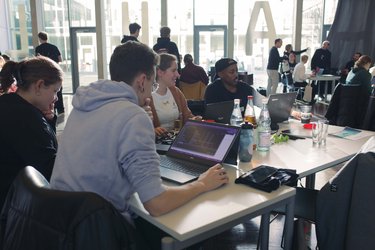
Three winning designs were awarded prizes by the judges at the end of hack4GDI_DE. In addition to the concept, idea, and technical implementation, the criteria also included the design of the concept and the presentation of the results.
Jasmin Rack (GDI-DE) at the reception desk for the students, Markus Schaffert, Falk Würriehausen and Fredie Kern at work
1st place: The analysis of Cycling mobility behavior in Baden-Württemberg by the team “Die BOings” from Bochum University of Applied Sciences impressed the jury with its precise implementation and skillful use of technical tools. The resulting website with interesting analysis tools such as time sliders and a dashboard provides a good overview even for non-experts. The judges also praised the excellent planning of the two-day project and the successful presentation.
https://t1p.de/hack4gdi_de_Platz1
The winning teams of #hack4GDI_DE on November 22 and 23, 2024: 1st place “Die BOings” (center), 2nd place “Meenzer Mäuse” (left), 3rd place “Spatial Wizards” (right)"
2nd place: The “Heat Hazard Map for the Aging Population in Mainz” by the “Meenzer Mäuse” (Mainz University of Applied Sciences) impressed the judges with its clear focus on a practical and highly relevant use case for geodata analyses. The logical and elaborate combination of the numerous databases and the successful map presentation of the solution was remarkable. At the same time, future-oriented options for action were developed based on the data analysis.
3rd place: The “Spatial Wizards” team took third place with their solution to the “Cycling infrastructure in Germany” challenge. Extensively researched and with a wealth of detail, the map view developed offers a great deal of interesting and useful information about Germany's cycle path network in a very clear way despite the short time available.
The students were delighted to be able to work with contemporary topics and work-related challenges. “We really enjoyed our project. We were able to develop applied use cases for authorities, for example, who can use them to take preventative action. The organization and the whole event were great and we would recommend it to anybody,” says Thomas Knäuper from the first-placed team ‘Die BOings’..
The high quality of the solutions to the three challenges impressed the judges, and did not make it easy for them to select the winning projects from the student teams. “We knew that the tasks would be a real challenge for the young participants. So we are all the more pleased to see such functional and creative solutions,” commented Dr. Falk Würriehausen, jury member and head of the GDI-DE's Architecture Working Group.
Prof. Dr. Markus Schaffert, lecturer at Mainz University of Applied Sciences and also a member of the panel of judges, also expressed his satisfaction. “We are delighted that Mainz University of Applied Sciences was able to host this great hackathon for the second time and that so many universities accepted our invitation. I am very impressed by what the students have achieved in such a short time. In the end, the team from Bochum deserved to come out on top. Congratulations to “Die BOings”, but also to the two teams from Mainz, who came in second and third with great results!"
The hackathon was implemented as a joint project of the GDI-DE and the i3mainz - Institute for Spatial Information and Surveying Technology at Mainz University of Applied Sciences with the support of the Federal Ministry of the Interior (BMI) and the Federal Ministry of Digital and Transport (BMDV). In addition, a challenge was posed by Markus Jackenkroll from Bochum University of Applied Sciences.
The first hack4GDI_DE took place in 2022 in collaboration with i3mainz, when it was conceived as an event exclusively for students at Mainz University of Applied Sciences. In the second edition, the organizers were delighted to welcome around 60 participants from five universities in the Rhine-Main region as well as Bochum and Karlsruhe.
The results of the hackathon will be available soon at www.gdi-de.org/hack4GDI_DE.
Photos: Christopher Folz and Nicole Vögtlin Bruhn, CC BY SA 4.0
